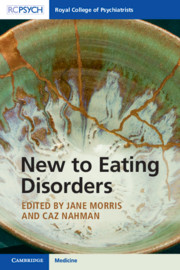Book contents
- New to Eating Disorders
- New to Eating Disorders
- Copyright page
- Contents
- Foreword
- Acknowledgements
- Introduction for Trainees and Students
- Chapter 1 What Are Eating Disorders?
- Chapter 2 Causes and Formulation
- Chapter 3 The Carer’s Perspective
- Chapter 4 Risk Assessment and Management
- Chapter 5 Ethical and Medico-legal Issues
- Chapter 6 Management of Eating Disorders
- Chapter 7 Nutritional Care: Dietetic Interventions Including Behavioural Interventions
- Chapter 8 Exercise and Activity
- Chapter 9 Body Image
- Chapter 10 Severe and Enduring Eating Disorders
- Chapter 11 Children and Adolescents
- Chapter 12 Transitions
- Index
- References
Chapter 4 - Risk Assessment and Management
Published online by Cambridge University Press: 12 June 2020
- New to Eating Disorders
- New to Eating Disorders
- Copyright page
- Contents
- Foreword
- Acknowledgements
- Introduction for Trainees and Students
- Chapter 1 What Are Eating Disorders?
- Chapter 2 Causes and Formulation
- Chapter 3 The Carer’s Perspective
- Chapter 4 Risk Assessment and Management
- Chapter 5 Ethical and Medico-legal Issues
- Chapter 6 Management of Eating Disorders
- Chapter 7 Nutritional Care: Dietetic Interventions Including Behavioural Interventions
- Chapter 8 Exercise and Activity
- Chapter 9 Body Image
- Chapter 10 Severe and Enduring Eating Disorders
- Chapter 11 Children and Adolescents
- Chapter 12 Transitions
- Index
- References
Summary
This chapter looks at ethical and medico-legal aspects of eating disorder treatment. Legal frameworks for involuntary treatment of this illness may be needed when risks are high and capacity is lacking. The reader is also introduced briefly to some of the different legal frameworks present in England, Northern Ireland, and Scotland. We mention eating disorder legislation in the United States. Ethical aspects of care are also discussed and should provoke thoughtfulness no matter what part of the world the clinician is working in.
Keywords
- Type
- Chapter
- Information
- New to Eating Disorders , pp. 20 - 26Publisher: Cambridge University PressPrint publication year: 2020

